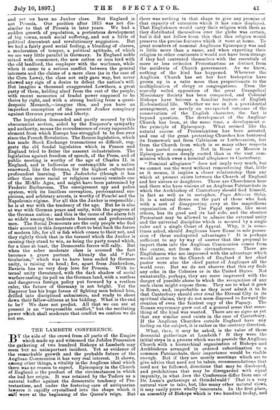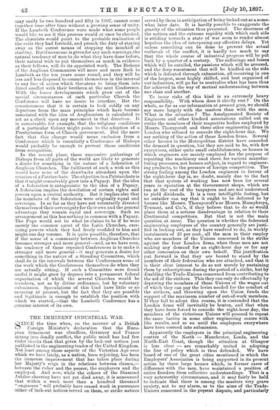THE LAMBETH CONFERENCE.
BY the side of the crowd from all parts of the Empire which made up and witnessed the Jubilee Procession the gathering of two hundred Bishops at Lambeth may seem but an unimportant incident. Yet as evidence of the remarkable growth and the probable future of the Anglican Communion it has very real interest. It shows, among other things, a vitality in the Anglican ideal which there was no reason to expect. Episcopacy in the Church of England is the product of the circumstances in which she had her origin. It was retained by the Tudors as a natural buffer against the democratic tendency of Pro- testantism, and under the fostering care of antiquarian lawyers it rapidly crystallised into the shape which it all wore at the beginning of the Queen's reign. But there was nothing in that shape to give any promise of that capacity of extension which it has since displayed. That Englishmen would carry their religion with them as they distributed themselves over the globe was certain, but it did not follow from this that this religion would preserve the precise features which it wore at home. To great numbers of nominal Anglicans Episcopacy was and is little more than a name, and when exporting their religion to other continents it would not have been strange if they had contented themselves with the essentials of more or less orthodox Protestantism as distinct from the accidents of Church government. As we know, nothing of the kind has happened. Wherever the Anglican Church has set her foot bishoprics have grown up in a ratio more than proportionate to the multiplication of clergy or congregations. Even the scarcely veiled opposition of the great Evangelical Missionary Society has been conquered, and Colonial Bishops have become a familiar feature of English Ecclesiastical life. Whether we see in it a providential arrangement, or merely an unexpected outcome of the conservatism of the English character, the fact is beyond question. The development of the Anglicar Church has been, at the same time, a development the principle of Episcopacy. What seemed like th6 natural course of Protestantism has been arrested, and one of the great protesting Churches has borrowed its framework not from Calvinism or Lutheranism, but from the Church from which in so many other respects it has parted company. Not in Rome or Moscow is Episcopacy more deeply rooted than in the vast com- munion which owes a nominal allegiance to Canterbury.
'Nominal allegiance" does not imply very much, but we cannot use the word without remembering that, little as it means, it implies a closer relationship than any which at present exists between the Church of England and her sisters or daughters. There are Churchmen here and there who have visions of an Anglican Patriarchate in which the Archbishop of Canterbury should find himself, in fact as well as in metaphor, Papa Alterius Orbis. It is a natural desire on the part of those who look with a sort of disapproving envy at the magnificent organisation of Rowe. The Papal system, like most others, has its good and its bad side, and the stoutest Protestant may be allowed to admire the external unity and the universal discipline which is secured by a single ruler and. a single Court of Appeal. Why, it is some- times asked, should Anglicans leave Rome in sole posses- sion of these undisputed advantages ? It is perhaps sufficient to say by way of answer that the proposal to import them into the Anglican Communion comes from the centre, not from the circumference. There are Englishmen who are impressed with the advantage which would accrue to the Church of England if her chief pastor were also the chief pastor of Anglicans all the world over. But we do not observe that this cry finde any echo in the Colonies or in the -United States. Not unnaturally, perhaps, they are more impressed with the danger of possible abuse to which the recognition of any such claim might expose them. They see to what it grew in Rome, and, improbable as they must admit it to be that Canterbury should ever rival the Eternal City in its spiritual claims, they do not seem disposed to forward the creation of even the faintest copy of the Papacy. The Roman supremacy grew out of a general sense that some- thing of the kind was wanted. There are no signs as yet that any similar need exists in the case of Canterbury. If the Anglican Churches outside England have any feeling on the subject, it is rather in the contrary direction_ ,What, then, it may be asked, is the value of these decennial gatherings at Lambeth ? If they were the initial steps in a process which was to provide the Anglican Church with a hierarchical organisation of Bishops and Archbishops arranged in ordered subordination to a common Patriarchate, their importance would be visible enough. But if they are merely meetings which are to give advice that need not be taken, recommendations that need not be followed, directions that may be disobeyed, and prohibitions that may be disregarded with equal impunity, in what does the Conference differ from one of Dr. Lunn's gatherings at Grindelwald ? That is a very natural view to take, but, like many other natural views, it may easily prove wholly inaccurate. In the first place, an assembly of Bishops which is two hundred to-day, and may easily be two hundred and fifty in 1907, cannot come together time after time without a growing sense of unity. If the Lambeth Conference were made what some people would like to see it this process would at once be checked. The alarmists would point to the probable realisation of the evils they had foretold, and preach the duty of staying away as the surest means of stopping the mischief at starting. But if no excuse is given for any such warnin gs, the natural tendency of men to do what they have done before, their natural wish to put themselves as much in evidence as their fellows, will do its appointed work. The Bishops of the Anglican Communion will more and more flock to Lambeth as the ten years come round, and they will be less and less disposed to commit themselves in the interval to any line of action which threatens to bring them into direct conflict with their brethren at the next Conference. With the lesser developments which grow out of the special circumstances of each particular Church the Conference will have no desire to interfere. But the consciousness that it is certain to look coldly on any departure from the main principles which have become associated with the idea of Anglicanism is calculated to act as a check upon any movement in that direction. It is conceivable, for example, that the religious conditions of a particular Colony might point to the adoption of a Presbyterian form of Church government. But the mere fact that this change would mean exclusion from a Conference which is essentially a Conference of Bishops would probably be enough to prevent those conditions from recognition.
In the second place, these successive gatherings of Bishops from all parts of the world are likely to generate a, desire for something in the nature of a federation of Anglican Churches. The fulfilment of such a wish as this would have none of the drawbacks attendant upon the creation of a Patriarchate. The objection to a Patriarchate is that it might conceivably grow into a Papacy. But the idea of a federation is antagonistic to the idea of a Papacy. A federation implies the devolution of certain rights and powers upon a central authority. But it implies also that the members of the federation were originally equal and sovereign. In so far as they have not voluntarily divested themselves of their sovereignty for their own and the general advantage they remain equal and sovereign. Such an arrangement as this has nothing in common with a Papacy. The Pope would not be what he claims to be if he were merely the common agent of the Latin Churches, exer- cising powers which they had freely confided to him and might one day resume. It is quite possible, therefore, that if the sense of a community between Anglican Churches becomes stronger and more general—and. as we have seen, the tendency of these repeated Conferences is to make it stronger and more general—it may generate a desire for something in the nature of a Standing Committee, which shall do in the intervals between the Conferences some of the work which the Conferences themselves do when they are actually sitting. If such a Committee were found useful it might grow by degrees into a permanent federal organisation of which the several Churches would be members, not as by divine ordinance, but by voluntary submission. Speculations of this kind have little or no meaning at present, but the fact that they are possible and legitimate is enough to establish the position with which we started,—that the Lambeth Conference has a genuine interest of its own.



































 Previous page
Previous page